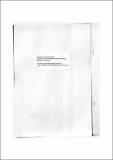| dc.contributor.author | Makau, B.M. | |
| dc.date.accessioned | 2011-12-05T15:42:12Z | |
| dc.date.available | 2011-12-05T15:42:12Z | |
| dc.date.issued | 1985-11 | |
| dc.identifier.citation | Makau, B.M.(1985) Educational planning and development in Kenya: the 8-4-4 school curriculum and its implications for self-employment. Working paper no. 433, Nairobi: Institute for Development Studies, University of Nairobi | en_GB |
| dc.identifier.uri | https://opendocs.ids.ac.uk/opendocs/handle/20.500.12413/1293 | |
| dc.description.abstract | Since the late 1960s a major feature of the Kenya economy has been the rising unemployment of school leavers. This problem, which has reflected the inability of the modern economy to create employment positions as fast as the education system has been producing aspirants, has greatly influenced the search for approaches aimed at making formal education more relevant to national development. Government Commissions as well as donors who have advised on Kenya's education since 1972 have been emphatic that education should concern itself with preparing learners for self employment. As a concerted effort to relate education more to development the 8-4-4 system of education, which has been government policy since early 1982, emphasizes among its goals the need for primary and secondary education to prepare learners for self-reliance. This emphasis is the theme of discussion in this paper.
The discussion is cast in the light of four theories which have been influential in the education for development debate in developing countries.
The paper centres on the 8-4-4 school curricula – its organisation, preparation for self-reliance and reform of the examination system. The objectives, content and examination procedures of the curricula are described in some detail. While it is accepted that in principle the 8-4-4 reforms are a step in the right direction, it is argued that implementation should be accompanied by continuous evaluation and experimentation so that shortcomings highlighted in the discussion are improved upon. In particular basic and action research should be employed in search of ways of relating education to life after school through a broad-based conceptualisation, development and implementation of curricula and examinations. | en_GB |
| dc.language.iso | en | en_GB |
| dc.publisher | Institute for Development Studies, University of Nairobi | en_GB |
| dc.relation.ispartofseries | Working Papers.;433 | |
| dc.rights.uri | http://creativecommons.org/licenses/by-nc-nd/3.0/ | en_GB |
| dc.subject | Education | en_GB |
| dc.title | Educational planning and development in Kenya: the 8-4-4 school curriculum and its implications for self-employment | en_GB |
| dc.type | Series paper (non-IDS) | en_GB |
| dc.rights.holder | Institute for Development Studies, University of Nairobi | en_GB |
| dc.identifier.blds | 52450 | |


